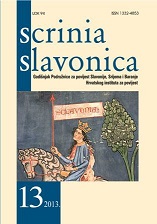Presuda ministru u Vladi Nezavisne Države Hrvatske Živanu Kuveždiću 1949.
VERDICT AGAINST ŽIVAN KUVEŽDIĆ, MINISTER OF STATE OF THE INDEPENDENT STATE OF CROATIA, IN 1949
Author(s): Vladimir Geiger, Suzana LečekSubject(s): History
Published by: Hrvatski institut za povijest
Keywords: Independent State of Croatia; NDH Government; Živan Kuveždić; Croatian Peasant Party; Srijem
Summary/Abstract: In spite of the Second World War being one of the most explored topics of the 20th century, in historiography only recently has developed a critical approach to the investigation of court proceedings concerning persons convicted of war crimes. With no intention to relativise in a “revisionist way” or to reduce the liability of Nazism and fascism (indeed, the majority of sentences proved to be well justifi ed) historians have realized that the great differences in the way of conducting legal proceedings and of delivering verdicts can be explained only if they are considered as part of long-lasting political processes (such as pre-war confl icts). Furthermore, settling scores with fascism proved to be extremely ruthless in countries having experienced an anti-fascist war and a socialist revolution, as in Croatia/Yugoslavia. Here, collaboration with the occupier, too comprehensive in its defi nition, became an exceptional instrument for the elimination of class and ideological/political enemies. As data on court proceedings against “enemies of the people” are defi cient and as there is no thorough study of the legal principles and proceedings the courts-martial acted on, every new insight on how the new state passed sentence on the war guilt of those belonging to the government of the Independent State of Croatia is valuable. One of the defendants, sentenced and executed, was Živan Kuveždić, minister without portfolio in the NDH (Independent State of Croatia) government. A pre-war representative of the Croatian Peasant Party of Srijem, during the war he joined the Ustasha regime and suffered the consequences. There is no doubt that with his credibility as eminent representative of the leading Croatian party, he played a certain role, even getting certain duties (the latest one, being a minister); however, allowing for all this, it becomes clear that they were only formal. Hence, it appears to be an appropriate case for the comprehension of the complexity of motives and types of collaboration (even of resistance, since there are testimonies to his “anti-Ustasha” attitude during the war) as well as of post-war judicial practice, punishing according to collective rather than personal guilt. In this paper the most signifi cant documents of his court proceedings are published. These are the indictment of the public prosecutor’s offi ce of Zagreb against Živan Kuveždić (of March 21, 1949), the verdict of the District Court of Zagreb (of March 27, 1949) as well as the verdict of the Supreme Court of the People’s Republic of Croatia (of April 30, 1949).
Journal: Scrinia Slavonica
- Issue Year: 2013
- Issue No: 13
- Page Range: 181-232
- Page Count: 52
- Language: Croatian

